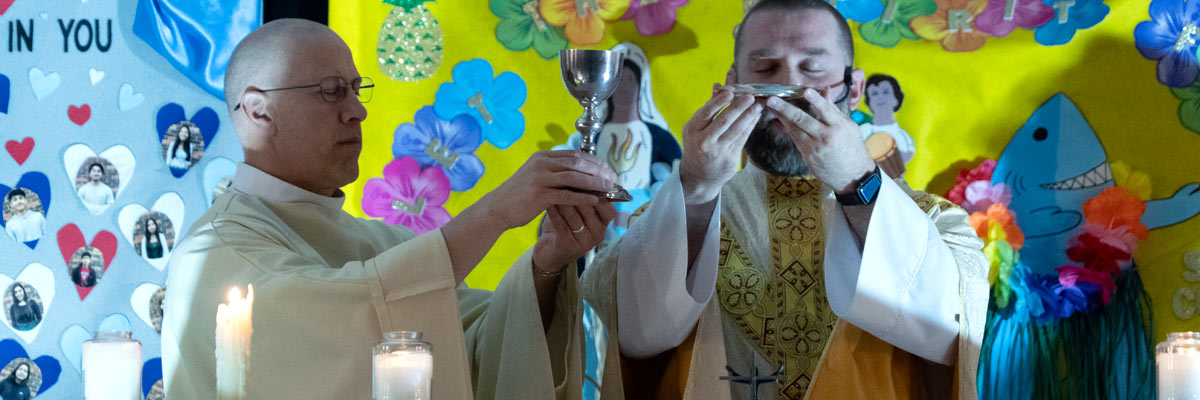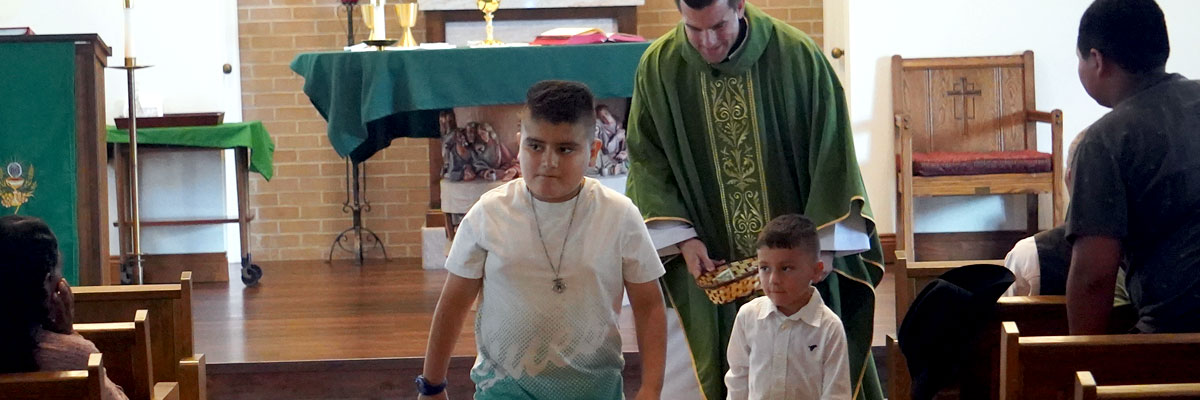Official Website of the
Catholic Diocese of Little Rock
Eighth Sunday in Ordinary Time, Year A
Published: February 26, 2017
Bishop Anthony B. Taylor preached the following homily during confirmation Masses at Immaculate Conception Church in North Little Rock on Saturday, Feb. 25, 2017 and Sacred Heart Church in Charleston on Sunday, Feb. 26, 2017.

Bishop Taylor
Many of us spend a lot of our time working to earn money and I'm glad you do. You have to support your families and of course support the Church. But in today's Gospel Jesus warns us of a danger lurking below the surface of this necessary human activity, namely the danger of giving too much importance to money and the things that money can buy.
He says: “You cannot give yourselves to God and money. I warn you, then: do not worry about your livelihood, what you are to eat or drink or use for clothing … look at the birds in the sky. They do not sow or reap … yet your heavenly Father feeds them. Are you not more important than they?”
Jesus invites us to open our eyes to the danger that we might give more importance to things than to our relationship with God. And here he is talking about the necessities of life: food, drink and clothing.
In American law today, the parents are consumers and the child in the womb is a commodity. The parents decide whether to keep the product or send it back (abortion), especially if quality control (amniocentesis) says there are defects. Some will sue for damages if the doctor doesn’t give them a perfect baby.
Can you imagine what he would say to those who put luxuries before their relationship with God? This is a very easy trap to fall into. The danger is that the pursuit of things can become our whole world and we begin to view all of reality as just so many goods.
And sad to say, many people in today's society have bought into this consumer mentality — indeed, we even say that we live in a consumer society. But letting this become the lens through which we view the whole world can easily distort our thinking in so many areas of life.
For instance: Whenever the main reason we come to Church is to get something out of it, we've turned religion into a commodity. We all want Mass to be a good experience, but whenever we leave feeling shortchanged — maybe the homily was mediocre or we didn't like the music — we need to ask why we came here in the first place.
The word, "Eucharist," means "thanksgiving" so the main reason for coming to church should be to give rather than to get: to give thanks to the Lord for his many blessings. And by the way, if you do come to give yourself to him, I guarantee you will always get something out of Mass — a life-giving relationship with Jesus and with his people.
Another example: Children become a commodity whenever we calculate how many we can afford to acquire and then use artificial means to prevent against excess “inventory” rather than first asking God in prayer to guide our decisions, and then using Natural Family Planning in order to work with the Lord in being wise stewards of the gift of life, all the while remaining open to whatever God’s will is for us.
But that’s not how it is for most Americans. In American law today, the parents are consumers and the child in the womb is a commodity. The parents decide whether to keep the product or send it back (abortion), especially if quality control (amniocentesis) says there are defects. Some will sue for damages if the doctor doesn’t give them a perfect baby.
Many adults in the work force have become commodities: We feel valuable so long as we are productive members of society. Our salaries tell us how much we are worth. Did you ever wonder why so many retirees die within a year of retirement? The time just weighs on them. They no longer feel worth anything because they are no longer producing anything.
Jesus challenges this consumer mentality. He calls it idolatry. He calls it slavery. He says: “You cannot be the slave of both God and money.” None of us can be the slave of two masters: We will either hate the first and love the second, or treat the first with respect and the second with scorn.
Each of us chooses the master of our life. Will we live according to the consumer mentality, which promises happiness that it cannot deliver and values us only for what we produce?
Or, will we live according to the Christian mentality that values us for who we really are — children of God, brothers and sisters of Jesus and each other, temples of the Holy Spirit having God-given intrinsic worth (even those people viewed by others as a burden on society) from the first moment of conception, through all those unproductive years of childhood and those supposedly unproductive years of old age, all the way to natural death?









